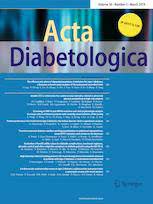The effects of probiotics and synbiotic supplementation on glucose and insulin metabolism in adults with prediabetes: a double-blind randomized clinical trial
Authors
Affiliations
Abstract
Aims: Probiotics and/or prebiotics could be a promising approach to improve metabolic disorders by favorably modifying the gut microbial composition.
Objectives: To assess the effects of probiotics and synbiotic on glycemic indices in prediabetic individuals who are at risk of type 2 diabetes and its complications.
Methods: In a double-blind, randomized, placebo-controlled parallel-group clinical trial, 120 prediabetic adults participated and were randomly allocated to receive either probiotics or synbiotic or placebo supplements for 24 weeks. Anthropometric measurements, food record, physical activity and glycemic biomarkers including glycated hemoglobin (HbA1C), fasting plasma glucose (FPG), fasting insulin levels (FIL), homoeostasis model assessment for insulin resistance (HOMA-IR), quantitative insulin sensitivity check index (QUICKI), and β-cell function (HOMA-B) were assessed at baseline and repeated at 12 and 24 weeks and compared within and between three groups using repeated measure ANOVA.
Results: Compared with the placebo, synbiotic supplementation resulted in a higher significant reduction in FPG (- 6.5 ± 1.6 vs. – 0.82 ± 1.7 mg/dL, P = 0.01), FIL (- 2.6 ± 0.9 vs. – 0.8 ± 0.8 µIU/mL, P = 0.028), and HOMA-IR (- 0.86 ± 0.3 vs. – 0.16 ± 0.25, P = 0.007), and a significant elevation in the QUICKI (+ 0.01 ± 0.003 vs. + 0.003 ± 0.002, P = 0.006). In addition, significant decreases in HbA1C was seen following the supplementation of probiotics and synbiotic compared with the placebo (- 0.12 ± 0.06 and – 0.14 ± 0.05 vs. +0.07 ± 0.06%, P = 0.005 and 0.008, respectively). HOMA-B was not found to be different between or within the three groups.
Conclusion: Glycemic improvement by probiotics and particularly synbiotic supplements in prediabetic individuals has been supported by current study. However, further studies are required for optimal recommendations in this important area of patient treatment.
Trial registration: Iranian Registry of Clinical Trials: IRCT201511032321N2, Date registered February 27, 2016.
Keywords: Clinical trial; Prediabetes; Probiotics; Synbiotic.

